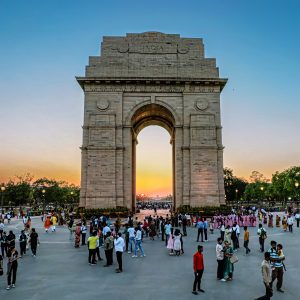Kashmiri leader sounds alarm over India’s move to amend Muslim Endowment Law
Muslim groups and opposition leaders argue the changes are politically motivated and aimed at further marginalizing India’s nearly 200 million Muslims
Muslim Network TV News
SRINAGAR, Jammu and Kashmir (MNTV) – A prominent Kashmiri religious leader, Mirwaiz Umar Farooq, has raised significant concerns over India’s proposed amendments to the Waqf or Endowment Act.
The law manages the centuries-old Islamic endowment system including vast properties used for religious, educational, and charitable purposes.
Speaking before India’s parliamentary committee in New Delhi, Farooq warned that the proposed Waqf Amendment Bill could jeopardize Muslim autonomy over community assets, increase government control, and lead to potential misuse of religious properties.
This appearance marked a rare public engagement by Farooq, who has been under house arrest since 2019 when India revoked Jammu and Kashmir’s semi-autonomous status.
Representing the Kashmiri religious group Mutahida Majlis Ulema (MMU), Farooq presented a detailed memorandum opposing provisions of the bill.
He emphasized that the law risks undermining Muslim representation and violating constitutional rights by mandating non-Muslim participation in Waqf boards and requiring re-registration of properties.
The Waqf system, which dates back to the 12th century, governs over 870,000 properties across India, including mosques, madrassas, graveyards, and orphanages.
The proposed amendments seek to modernize the system, tackle corruption, and improve efficiency, according to Prime Minister Narendra Modi’s government.
However, Muslim groups and opposition leaders argue the changes are politically motivated and aimed at further marginalizing India’s nearly 200 million Muslims.
One of the most contentious aspects of the bill is the removal of the “waqf by user” provision, which historically recognized properties like mosques and dargahs without formal documentation.
Critics fear this change could expose such sites to legal disputes and encroachment.
Many Waqf properties lack legal records due to historical donation practices, making them vulnerable to reclassification.
The bill also introduces stricter oversight by district officials and limits the authority of Waqf boards. Activists warn these measures could strip Muslim communities of control over their assets.
Asaduddin Owaisi, a prominent Muslim parliamentarian, called the bill a “deliberate attempt to dispossess Muslims of their lands.”
While some acknowledge the need for reforms to address corruption and inefficiencies within Waqf boards, they argue that the current amendments disproportionately empower the state and fail to consider the sensitivities of the Muslim community.
A 2006 report by the Justice Sachar Committee highlighted the potential for Waqf properties to generate significant revenue if managed effectively but also noted widespread encroachments by individuals, businesses, and government entities.
Farooq’s delegation urged the government to approach reforms with caution, ensuring they preserve the sanctity of Waqf traditions and uphold minority rights.
Farooq warned against actions that could exacerbate existing tensions in the region, particularly in Jammu and Kashmir, where Waqf matters are deeply intertwined with the Muslim-majority population’s identity.
The parliamentary committee is expected to delay its report on the bill amid growing backlash.
Farooq expressed hope that the government would heed the concerns raised, saying, “We urge the government to respect the autonomy of Waqf institutions and avoid steps that disempower the Muslim community.”
Critics argue that reforms, while necessary, must balance modernization with protecting the historical and religious significance of Waqf properties, ensuring they remain a source of support and pride for India’s Muslim population.







